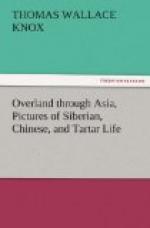Holding up an article he praised its good qualities and named its price.
“Five roubles; very good; five roubles.”
I shook my head.
“Four roubles; yes; good; four roubles.”
Again I made a negation.
“Three roubles; very good; yes.”
I continued shaking my head as he fell to two and a half, two, and finally to one rouble. I left him at that figure, or it is possible he would have gone still lower.
“They are great rascals,” said Borasdine as we walked away. “They ask ten times the real price and hope to cheat you in some way. It is difficult to buy anything here for its actual value.”
We went through more streets and more mud, passing butchers’ shops where savage dogs growled with that amiable tone peculiar to butcher dogs everywhere. We passed tea shops, shoe shops, drug stores, and other establishments, each with a liberal number of clerks. Labor must be cheap, profits large, or business brisk, to enable the merchants to maintain so many employees.
At the end of a long street we came to the guard-house, near the entrance of the military quarters. We entered the dirty barrack, but saw nothing particularly interesting. I attempted to go inside the room where the instruments of punishment were kept, but the guard stood in the way and would not move. The soldiers in this establishment had evidently partaken of a beverage stronger than tea, as they were inclined to too much familiarity. One patted me on the shoulder and pressed my hand affectionately, indulging the while in snatches of Chinese songs.
In the prison were two or three unfortunates with their feet shackled so as to prevent their stepping more than four inches at a time. While we stood there a gaily dressed officer rode past us on a magnificent horse, reminding me of an American militia hero on training day. We looked at the fence of palisades, and stepped under the gateway leading to the government quarter. Over the gate was a small room like the drawbridge room in a castle of the middle ages. Twenty men could be lodged there to throw arrows, hot water, or Chinese perfumery on the invading foe.
A Manjour acquaintance of our captain invited us to visit his house. We entered through the kitchen, where there was a man frying a kind of ‘twisted doughnut’ in vegetable oil. The flour he used was ground in the Manjour mills, and lacked the fineness of European or American flour. Judging by the quantity of food visible the family must have been a large one.
The head of the household proclaimed himself a Tartar, and said he was the proprietor of four wives. I smoked a cigar with him, and during our interview Borasdine hinted that we would like to inspect his harem. After a little decorous hesitation, he led us across an open and muddy courtyard to a house where a dozen women were in the confusion of preparing and eating supper. With four wives one must have a proportionate number of servants and retainers, else he cannot maintain ‘style.’




